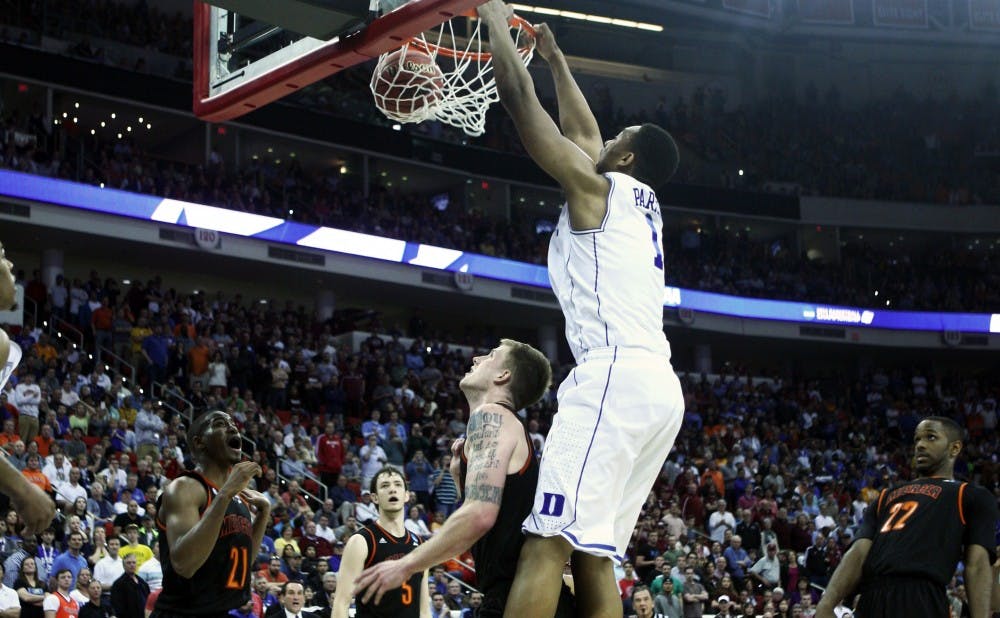Some experts had pegged Mercer to be a Cinderella in the NCAA tournament. The team’s overall height, combined with the experience of their seven seniors compared to Duke’s two and one graduate student on scholarship, would propel the No. 14 seed past the No. 3, they predicted. So, in one of my four brackets, I listened to their advice. I advanced Mercer to the Round of 32. It hurt me to do so—and it hurt even more when the Bears came out on top in the tournament.
I’ve hardly been able to talk about Duke’s loss since March 21. As soon as the horn sounded and the Blue Devils sulked off the PNC Arena court, my phone exploded with messages from my non-Duke friends—“DOWN GOES DUKE!” “Lol @ Mercer beating you.” “*Expletive* Duke! They *expletive* *expletive*.” It was crushing, and there may or may not have been tears involved.
Yet, simultaneously, I was the teensiest bit satisfied. After all, at least one of my brackets wasn’t busted. But still, was I a bad Duke fan for picking Mercer to advance over the Blue Devils—and for using a more logical approach to do so?
Discovering a balance between pragmatism and loyalty is one of the toughest tasks of any sports fan. We all are programmed to root for our favorite teams no matter what. Even if it takes a miracle—such as a buzzer-beating 3-pointer by a freshman point guard—I will cheer on the Blue Devils until the bitter end, whether they're projected to win by 20 or lose by 20.
But, at the same time, it’s unrealistic to believe that Duke will go undefeated every season. I will bleed blue until the day I die, yet I secretly judged all of the people in my bracket pools who picked the Blue Devils to win the tournament. Duke barely eked out a victory in the first round of the ACC tournament against Clemson, then fell to Virginia by 11 points in the tournament final. There was something off about them as they entered the NCAA tournament, so I believed that only oblivious, idealistic people would choose them to win it all.
Of course I hoped for Duke to go far in the tournament, but I needed to infuse some realism into my bracket decisions—and that's why I picked Mercer to win.
At the bitter end of the Blue Devils’ loss to the Bears, as Mercer went on an 18-8 run to close out the contest, I still rooted and prayed for Duke. However, the evil, inhuman part of me gave myself a pat on the back for being realistic about the Blue Devils’ chances, and rightfully predicting them to lose in one of my brackets.
But maybe the Blue Devils are a bad example of the struggles of establishing a balance between practicality and loyalty, because being practical and being loyal to Duke are usually the same thing. The Blue Devils have a fighting chance to win every single game they play, and they are perennial postseason contenders. Even if all of the experts in the world foresee Duke losing to an opponent, betting against the Blue Devils is usually the wrong move.
A better example would be my hometown baseball team, the Philadelphia Phillies. I have been a devout Phillies fan my entire life, and I happened to grow up during the team’s golden era. From 2007 until 2011, the Phillies were comparable to Duke—they had a stacked roster full of some of baseball’s biggest names, won 90-plus games every year and never missed the postseason. But since 2011, they’ve been on a sharp decline. My childhood heroes are now shadows of their former selves—former All-Stars now pushing 40 years old—and they haven't made the postseason in a few years, let alone compiled a winning record.
Nonetheless, the Phillies opened their season Monday with a 14-10 victory over the Texas Rangers. I spoke to my dad, the world’s biggest Phillies fan, on the phone afterwards about it.
“It’s going to be different this season!” my dad exclaimed. “The offense exploded, the bullpen was solid—we can definitely make a run!”
My dad is the most logical person I know, yet has an almost childlike innocence in his belief that, against all odds, his favorite team will win. I, however, fresh off of Mercer's victory, wasn't as optimistic.
“I don’t know, Dad,” I said. “Their starting pitching was bad, and I think our window has shut.”
“Don’t be like that,” he replied. “You need to believe in them. Aren’t you a true fan?”
I know I'm a true fan, and I think my dad is too. You don't become a true fan by attaining a balance between practicality and loyalty—in fact, striking that perfect combination is part of the adventure.
Sports fandom is a journey filled with many highs and lows. As a Duke fan, our lowest lows occurred two seasons ago against Lehigh and again a few weeks ago against Mercer—an early tournament exit against a low-seeded team. However, one unthinkable day, the reality is that Duke basketball may not be the spectacular team it is now. It won't be practical to expect the Blue Devils to make the tournament every season, and it won't be impractical to think that they'll beat Virginia Tech or Boston College every game, either.
When that day comes, we’ll need to adjust our expectations. We'll need to approach each game differently, a bit more practically. What can't change, however, is our loyalty to Duke. No matter what, a true sports fan must act like my dad—cheering on the Blue Devils until your voice is hoarse and never giving up.
Get The Chronicle straight to your inbox
Signup for our weekly newsletter. Cancel at any time.

